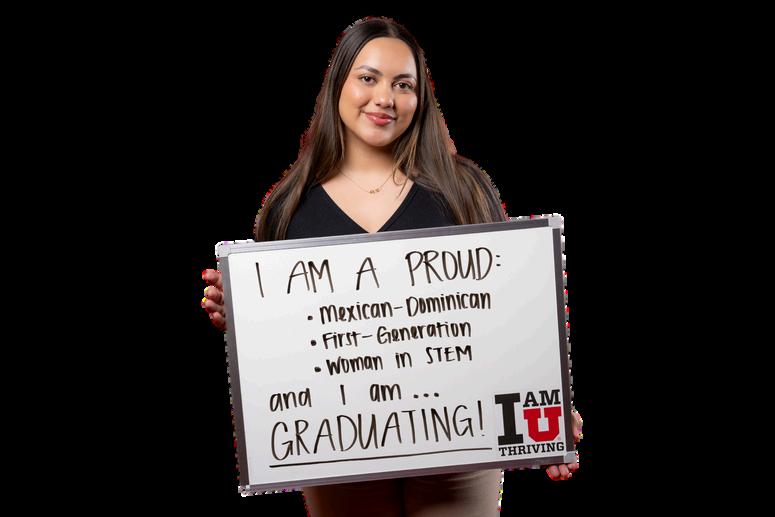









I Am U Thriving (IAUT) is a visual storytelling campaign created to spotlight the beautiful tapestry that is our campus community here at the University of Utah. Our campus community is made up of incredible individuals like Dr. Daniel Mendoza, whose research on air quality has informed both policy and public health efforts; Vice President of Student Affairs, Dr. Lori McDonald, a strong advocate for student success; and Dr. Nalini Nadkarni, whose ecological work and science communication have inspired communities nationwide.
Storytelling has been a common thread in societies across many countries and millennia. From the oral storytelling traditions of the Khoisan people of Southern Africa, often cited as among the earliest known cultures, to the linguistic richness of Papua New Guinea, home to over 800 spoken languages and dialects, storytelling adapts and persists. The creation of sign languages, such as American Sign Language (ASL) in the early 19th century, further expanded the ways communities could preserve and share their stories across generations and modalities.
After completing our workshop, you will be able to:
Identify the elements of impactful visual storytelling.
Explore your own culture through narrative and imagery. Create and share your story in a way that contributes to a more inclusive and connected campus culture. Understand the role of storytelling in community building, resilience, and thriving.

Reflecting on your own personal culture and community capital is important because it allows you to recognize the unique assets you bring to academic and professional spaces. It gives you a deeper understanding of how your background has shaped your values, resilience, and ways of thinking.
At the same time, it’s equally important to recognize and value the cultural wealth of others, especially those whose experiences differ from yours. Doing so fosters empathy, encourages more inclusive learning environments, and helps you build stronger, more respectful relationships across diverse communities.
Culture shows up in all kinds of ways, big and small. It’s what we say, what we eat, how we celebrate, how we support one another, and what we believe. That’s the richness we’ll be talking about as we explore cultural wealth and begin to tell our stories.
So take a moment to reflect. What makes up your culture? What makes it meaningful to you?


Before we dive into the Cultural Wealth Model, let’s talk about something a little more personal: culture!
Culture isn’t just about where you ' re from. It’s about who you are, what you value, and how you move through the world. So, before we jump into theory and definitions, take a minute to think about your own cultural roots and experiences.
1.What foods are a regular part of your family’s table, the ones that feel like comfort or celebration?
2.What music, dances, or traditions do you take part in?
3.Are there any rituals, prayers, or customs that connect you to your history or community?
4.What stories, styles, languages, or values have been passed down in your family?



Writing a personal statement using the Cultural Wealth Model is a powerful way for you to highlight your strengths and lived experiences. This approach also helps you think critically about the cultural capital of your peers, especially those who may come from underrepresented backgrounds.
The Cultural Wealth Model, developed by Tara Yosso, emphasizes the community cultural wealth that you, and other students, often carry with you. These are valuable forms of capital that are often overlooked or undervalued in traditional education systems. We will utilize this model to tell our cultural stories to share the diverse beauty here at the University of Utah. Are you ready? Let’s go!

The Six Forms of Capital in Yosso's Cultural Wealth Model:
1 Aspirational Capital – The ability to maintain hopes and dreams for the future, despite barriers.
2.Linguistic Capital – The intellectual and social skills gained through communication in more than one language or style
3.Familial Capital – Cultural knowledges nurtured among family and kin that carry a sense of community and support.
4.Social Capital – Networks of people and resources that provide support in navigating institutions.
5 Navigational Capital – Skills to maneuver through social institutions, especially those that were not designed for you.
6.Resistant Capital – Knowledge and skills from opposing inequality and striving for social justice

You don’t need to cover all six forms. Pick 2–4 types of cultural capital that resonate most with your experiences Check out the examples below to help you start crafting your story!
Open with a vivid story, quote, or moment that captures your identity or journey. Briefly introduce the theme: how your cultural wealth has shaped you.

"The first time I translated a parent-teacher conference for my mother; I was only nine What I didn’t realize then was that I was developing a fluency that went beyond language, I was learning to navigate two worlds with confidence."
Linguistic Capital
“I didn’t grow up with a lot of money or connections, but I’ve always had big dreams Even when people around me said college wasn’t for “people like us,” I held onto the belief that I could get there. My parents couldn’t help me with applications, but they taught me how to work hard, how to keep going even when things felt impossible.”
Aspirational Capital
“Growing up, my family wasn’t perfect, but they always made sure I knew I belonged Every holiday, every meal, was full of stories about where we came from and what we stood for. Even when I struggled in school, my cousins and aunts believed in me and pushed me to keep going. That sense of love and responsibility taught me how to stay strong and support others, no matter what ”
Familial Capital


The ability to maintain hopes and dreams for the future, despite barriers
Share how you’ve kept focused on your goals despite obstacles. Include stories of perseverance or dreams passed down by family.
The intellectual and social skills gained through communication in more than one language or style.
Discuss bilingualism, storytelling traditions, cultural rituals, or lessons from family
Reflection Questions
What languages, dialects, or styles of communication do you use in different parts of your life?
How do you shift your communication depending on where you are or who you ' re with?
In what ways has your ability to communicate across cultures or contexts been a strength?
Example:
“Growing up in a multigenerational home, I learned empathy by listening to my grandmother’s stories about migration and resilience Her words sparked my interest in oral histories and community organizing ”
Reflection Questions
What are some dreams or goals you’ve held onto, even when things got tough?
Who or what helps you stay hopeful when faced with obstacles?
Can you think of a time when someone believed in your potential, even when it wasn’t easy to see?
Example:
“Even when we had to move between apartments multiple times in high school, I never missed a deadline My mother reminded me, ‘We didn’t come this far for you to stop now.’ That hope became fuel.”



Networks of people and resources that provide support in navigating institutions.
Reflection Questions
Who are the people in your life who help you get through challenges, especially in school, work, or other systems?
How have relationships or connections helped you access opportunities or support?
Have you ever leaned on your community to figure something out or move forward?
Example:
“When I was in high school, my aunt connected me with a family friend who worked at a local law firm. That connection helped me land a summer internship, which gave me real-world experience and later strengthened my college applications. Having people in my network who could open doors for me made a huge difference that’s social cultural capital ”

Cultural knowledge nurtured among family and kin that carry a sense of community and support.
Reflection Questions:
What lessons, values, or traditions have you learned from your family or chosen family? How does your family or community show care, support, or resilience? What stories or memories from your family hold meaning for you today?
Example:
“Growing up, my parents always stressed the value of education. They didn’t have college degrees, but they encouraged me to study, took me to the library, and taught me how to speak confidently to teachers Even without much money, they gave me the support and mindset I needed to succeed in school, that was the cultural capital I carried with me.”



Skills to maneuver through social institutions, especially those that were not designed for you
Reflection Questions:
What systems or spaces have you had to figure out largely on your own?
Knowledge and skills from opposing inequality and striving for social justice.
Talk about experiences where you challenged injustice or became an advocate Reflect on how this shaped your goals
Reflection Questions:
When have you spoken up or taken action in the face of injustice?
What values drive you to challenge unfairness or create change?
How have you learned from your own experiences or your community's history of resistance?
Example:
“When I noticed my school didn’t offer AP classes in our neighborhood, I started a petition with classmates. That effort taught me that change starts with voices like mine.”
How have you learned to “navigate” schools, jobs, healthcare, or other institutions that didn’t fully reflect your background or needs? What strategies have helped you succeed in unfamiliar or challenging environments?
Example:
“As a first-generation college applicant, I leaned on mentors from my community center to understand FAFSA and college applications. Now, I mentor others.”


“I’ve
learned to turn cultural borders into bridges. As I enter college, I bring with me a legacy of resilience, love, and vision, not just for myself, but for my community.”
Now it's time to bring your story full circle. What parts of your culture have inspired and guided you on your journey to higher education? Who has supported you along the way? And what message would you like to share with the University of Utah community as you begin this new semester?
Don’t worry about making it perfect - just speak from the heart. And if you need help, our facilitators are here for you.
We’re excited to learn about culture with you, from you, and alongside you
With gratitude,
The CCE Team
Be authentic. Let your story and voice shine through.
Reconnect with your opening.
Reflect on how your cultural wealth prepares you for college or your future goals. End with a forward-looking statement
Avoid over-explaining or apologizing Cultural wealth is an asset, not a deficit
Connect experiences to future goals. How do these values prepare you to succeed and give back?
What values do you want people to associate and see a part of you in?
Why is it important to understand your Cultural Wealth?
How has understanding your cultural wealth changed your views about your culture and communities? How has it changed your view of your peers on campus learning alongside you?
